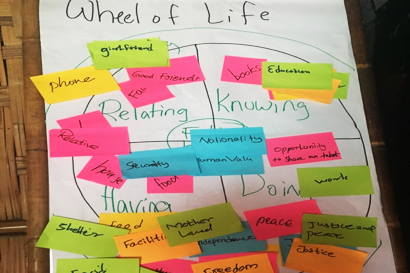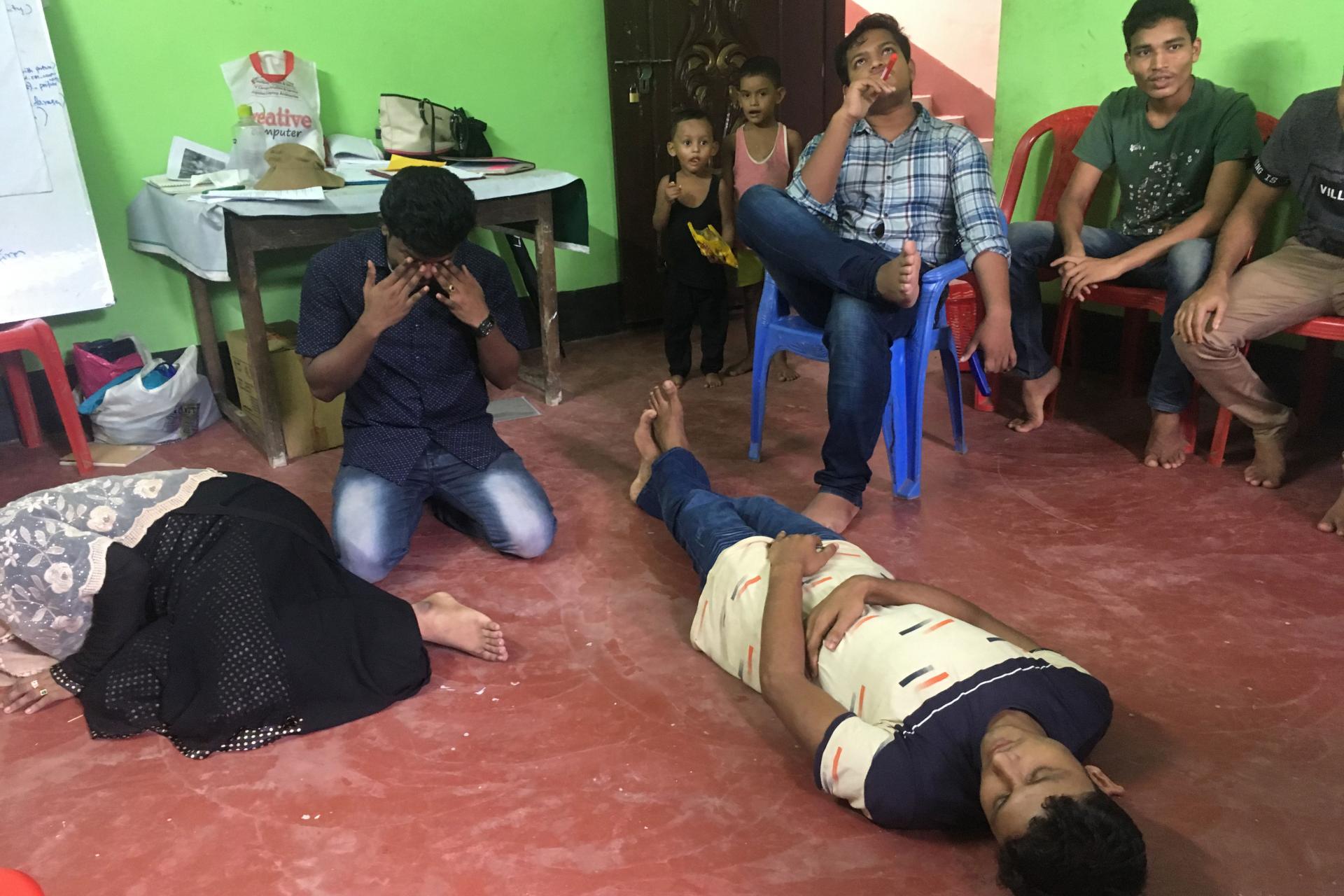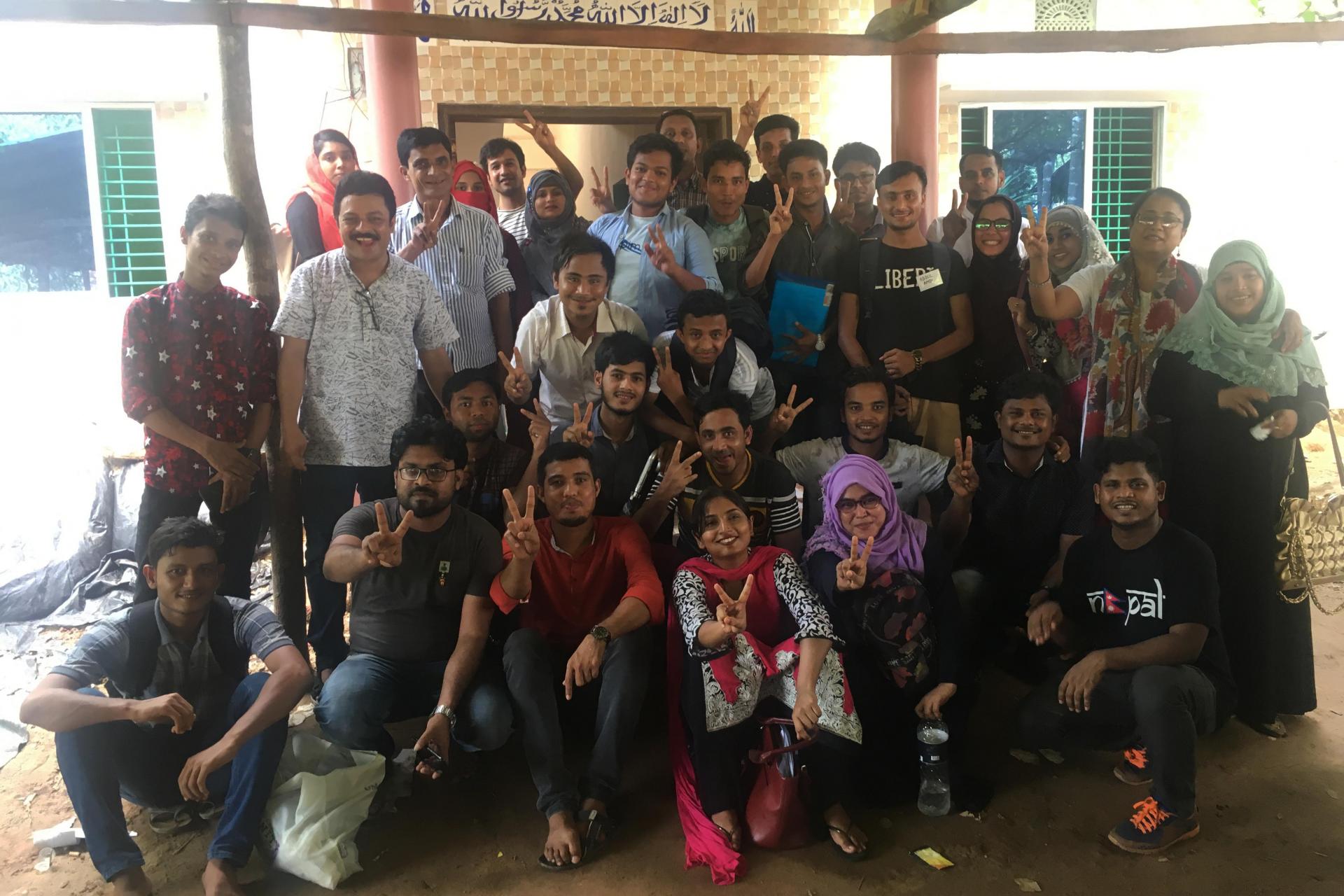Field Note: Knowledge Exchange in the Rohingya Camps in Cox's Bazar
In July 2019, Dr Rebecca Sutton (Teaching Fellow in Human Rights) travelled to Cox's Bazar in Bangladesh to carry out knowledge exchange on law, peace and empathy in the Rohingya camps, and has produced a field report on her training events to better help displaced populations gain adequate legal literacy to understand and articulate challenges they are facing in terms of rights and protection.

Field Note from the Rohingya Camps in Cox’s Bazar: Knowledge Exchange on Law, Peace and Empathy
By Rebecca Sutton, Teaching Fellow in Human Rights
Since August 2017, over 900,000 Rohingya individuals fleeing violence in Myanmar have resided in camps in Cox’s Bazar, in neighbouring Bangladesh. These displaced individuals face issues of statelessness and are also vulnerable due to traumas they have experienced through the extreme violence perpetrated against Rohingya populations in Myanmar. There are an increasing number of international agencies present on the ground, delivering humanitarian services and engaging in protection-related activities. To date, however, there has been little concerted effort to build the capacity of displaced populations so that they have adequate legal literacy to understand and articulate challenges they are facing in terms of rights and protection.
As an academic researcher who formerly worked in the field of humanitarianism and human rights practice, I am interested in experimenting with research methods that do not involve conventional (extractive) approaches such as interviewing. I am currently developing a new research project on the role of emotions in international law, and I have been thinking about how I might use trainings as a creative and reflexive way of learning about affect and embodied practices. My hope is also that participatory training methods might have some emancipatory potential, making these methods appropriate as well as illuminating in situations where participants have experienced the trauma of violence and conflict. Edinburgh Law School’s knowledge exchange funding presented a perfect opportunity to learn about a context that is new to me and to pilot some of these research methods and techniques.
With funding support from Edinburgh Law School, I traveled to Cox’s Bazar in July 2019 to carry out knowledge exchange activities in the Rohingya camps. I engaged in two separate training events. For the first initiative, I delivered a two-day ‘participatory action research’ (PAR) training for members of Rohingya Youth for Legal Action, a camp-based youth organization that advocates for youth rights in the camps. The seven young participants who came to the training are extremely bright and knowledgeable about what their community needs and they are eager to play an active role in bringing about change. The main goal of this training was to equip them with basic research skills so that they can effectively gather and report on community views about issues that matter to them. More broadly, I hoped to encourage these youth leaders to take on an identity as researchers, so that they see themselves, rather than outside experts, as the real change-makers in their community. The young camp residents can take these skills with them when they eventually return home to Myanmar.

community members.
Drawing on a training methodology called the People-First Impact Method, which was developed by Paul O’Hagan and Gerry McCarthy, I led the PAR training participants through a set of exercises that touched on the following: communication (how to move from superficial engagement to deeper feelings, emotions and ideas); the ‘Wheel of Life’ (to get in touch with the common humanity of all actors in the camp context); practical interview techniques; identifying community problems and conflicts; building research projects and addressing issues such as diversity and research bias. When asked to identify the main challenges that they are facing in everyday life, participants chose (the lack of) formal education in the camps as the most pressing issue; crime, human trafficking and gender-based violence were also high on the list.

community perspective on life.
We set about building an education survey that they could administer to fellow camp residents, in order to gather community sentiments about education in the camps and what it should look like. The Edinburgh Law School knowledge exchange funding enabled me to purchase 7 electronic tablets, and these have been given to the RYLA members so that they can develop and administer their own surveys. We are using a free data collection software developed by Harvard University and UN-OCHA called Kobo, which enables me to liaise remotely with the youth group and follow the findings they gather from afar. The next stage will be for the RYLA members to carry out the research and, hopefully, to share their findings with international agencies, such as UNICEF, who are responsible for camp education.
The second training initiative emerged serendipitously, when a contact of mine Jessica Olney working as Technical advisor of COP and CBLP projects and Visiting Researcher of Centre for Peace and Justice (CPJ), BRAC University, was in urgent need of a back-up trainer to deliver a training that coincided with the dates of my visit. This peacebuilding ‘Training of Trainers’ (TOT) was organized by CPJ BRAC University and supported by USAID. The curriculum of the training was developed in collaboration with Kara Wong and based on the ‘Sky School’ education program for refugee youth. 14 Rohingya leaders have been selected through a competitive process to participate in the peacebuilding ToT, and upon completion of the 16-days of training they will be supported to go out into their communities and deliver the training themselves.
Crucially, the TOT training will also be provided to members of the Bangladeshi host community, to increase prospects for community peacebuilding within and across the host and Rohingya communities living in Bangladesh. I delivered a series of sessions together with two CPJ team members - Nilufa Sultana Sheta helped to plan and run the training, and Azizul Hoque also helped to run it and translated to Rohingya. Topics included: active listening; empathy (using Augusto Boal-style ‘image theatre’, which uses still images to explore abstract concepts such as emotion (see ‘empathy lesson’ photo below); structural barriers to peace; introduction to conflict analysis (see ‘conflict tree’ photo below), and stakeholder analysis.





